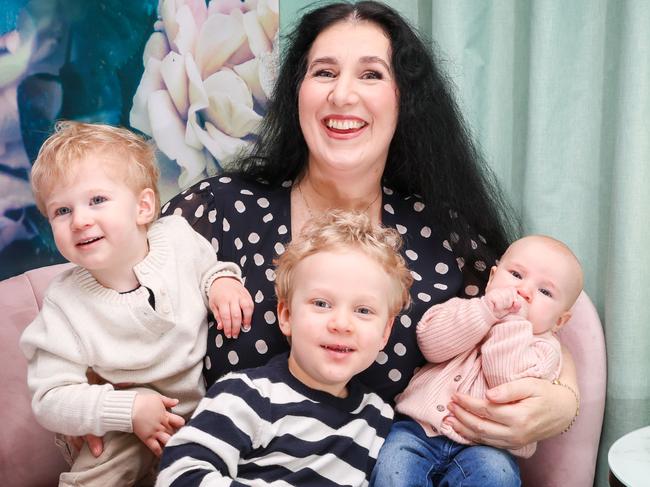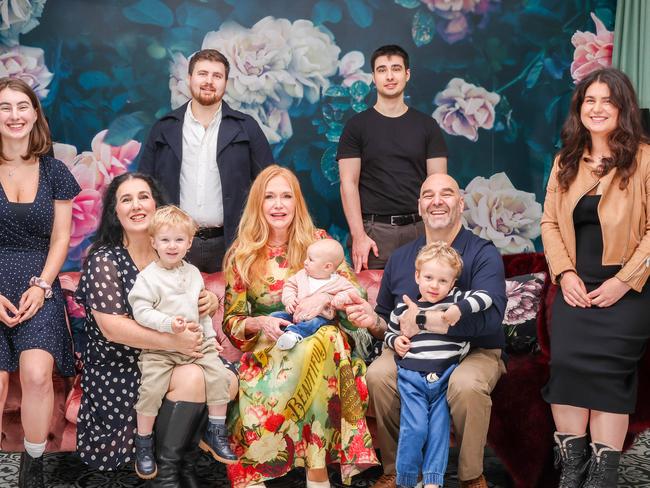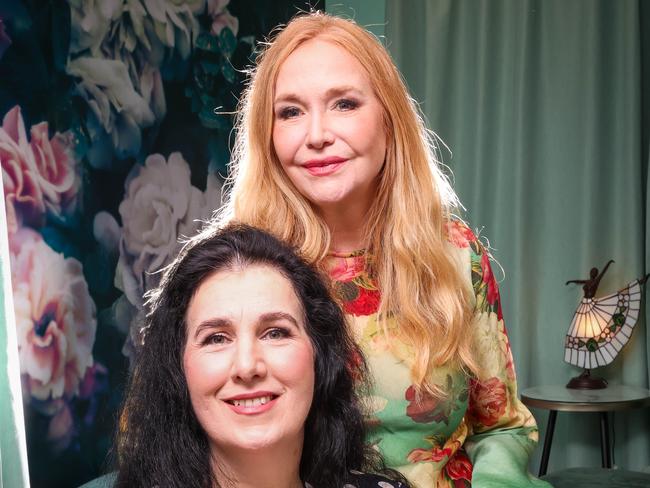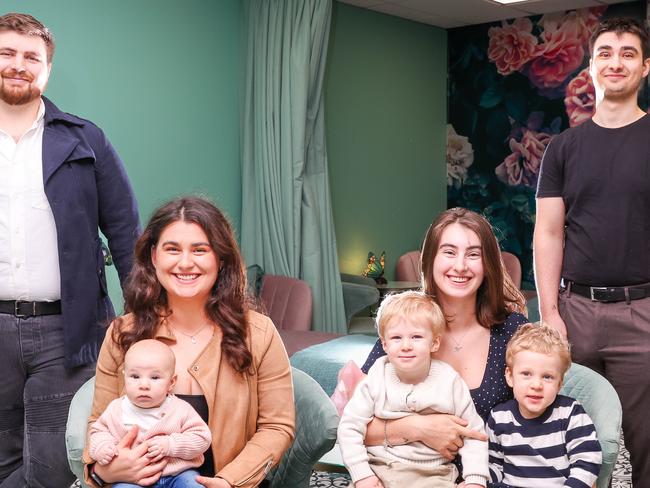Super mum Rosie Giampaolo, 53, welcomes three babies through IVF in as many years
A mum-of-eight who has had three babies in the past three years has urged others not to judge older women who turn to IVF to create the family of their dreams.
Victoria
Don't miss out on the headlines from Victoria. Followed categories will be added to My News.
Melbourne super mum Rosie Giampaolo has given birth to three IVF babies in the last three years.
At 53, she knows some will question her decision to have babies later in life, but Mrs Giampaolo said it was a considered choice made with expert medical guidance and fully supported by her family.
“Really, it is no one’s business, but ours,” she said.
“When I met (my husband) Rob he didn’t have children of his own and it was important to me to give him that. Our goal was to have a family together.
“Dr Lynn made our dreams a reality.”

“Dr Lynn” is IVF specialist Lynn Burmeister who, with the generosity of an egg donor the couple met through Egg Donors Australia, helped them welcome Luca, 3; Leonardo, 2 and baby Leia.
Mr Giampaolo, 49, and five adult children from Mrs Giampaolo’s first marriage agree that the newest additions bring love, joy and a little chaos to their busy home.
“It has definitely changed things,” daughter Natasha Coxhill says. “There is a lot more energy and laughter.”
Three generations of the family live together including Mr Giampaolo’s elderly mum and his brother who requires around-the-clock care.

Mrs Giampaolo’s two eldest children James, 31 and Hayley-Rose, 29; do not live at home, but Christine, 27; Natasha, 24 and Marc, 22 do.
“We don’t always get everything right,” Mrs Giampaolo said. “I am looking around the room and there’s books and dinosaurs and toys, but we wouldn’t have it any other way.”
It does irritate her that with fertility the focus is on a woman’s age when men can have babies at any age.
“Look at (actor) Cameron Diaz. People are saying: ‘Oh, she’s 51, why is she still having a child at that age?’”
The latest data from the Australian Bureau of Statistics confirms Australian women are having fewer children, and having them later in life.
“Younger people might say ‘that won’t be me’, but you don’t know. Circumstances change,” Mrs Giampaolo said.

Dr Burmeister, the medical director of No. 1 Fertility, says she sees “many Victorian woman over the age of 45” wanting to have babies with egg donors. Her clinic has helped to bring more than 7000 babies into the world in the last five years.
The Giampaolos turned to Dr Burmeister in 2020 after trying for more than eight years to have a baby and suffering the heartbreak of a miscarriage.
Dr Burmeister says a patient review panel must provide approval for women over the age of 52 and most IVF couples settle for one or two babies.
“Usually they say one if we’re lucky, because an IVF baby is a miracle baby, let’s face it,” Dr Burmeister said.

“Rosie’s had a full assessment with a high risk obstetrician, and she’s fit and healthy. Yes, there are risks having babies (for older mums), but we have 30-year-olds having risks. Pregnancy comes with risks.”
Dad Mr Giampaolo says his family is living the life they always wanted.
“People raise their eyes and think we are crazy, but we have friends having babies who are older than us, so to us we are not unique,” he said.
Mrs Giampaolo said it was their choice to have babies as older parents. Now she wants to advocate for older mums.
“I want women over 50 to know they have the right to have children. It is their choice,” she said.
Rise in mums aged 35 and older
Almost one in three mums were aged over 35 when they gave birth last year, as more Victorian women opt to have children later.
More than 30 per cent of Victoria’s 72,932 births last year were to mums 35 and older, according to deaths and marriages data, compared to 20 per cent in 2003.
Despite this shift, births by women over 40 – which has more than doubled in 20 years – still remained uncommon, making up just 6 per cent.
Just 330 women – 0.05 per cent of mums – had turned 45 when they gave birth last year, up from 94 in 2003.
The majority of mothers – 38.9 per cent – were still in their early 30s when they gave birth, similar to 2003 figures.
The age shift was driven by a change in the second-most common age bracket – when a quarter of all women give birth – which changed from late 20s in 2003 and 2013, to late 30s in 2023. Women aged 35-39 made up exactly 25 per cent of new mums last year, compared to 17.7 per cent 20 years ago.
The data also showed almost 3000 fewer women had a baby in 2023 compared to 10 years earlier, falling from more than 75,000 in 2013 to 72,932 last year.
The previous decade – 2003 compared to 2013 – had seen an increase of more than 14,000 births.
The fall in the past decade was entirely driven by a decline in mums in their teens and early 20s.



